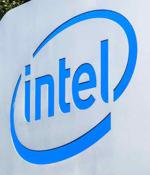Security News

Intel has addressed Wi-Fi and Wireless Bluetooth drivers issues causing Windows 10 blue screen of death errors and Bluetooth devices to lose connection or stop working. The new Intel Wireless drivers address Windows 10 stop errors and issues causing wireless adapters to fail to connect to 5GHz networks.

Chromium-based browsers such as Microsoft Edge and Google Chrome will soon support the Intel CET security feature to prevent a wide range of vulnerabilities. Intel's Control-flow Enforcement Technology is a hardware security feature initially introduced in 2016 and added to Intel's 11th generation CPUs in 2020.

Intel addressed 57 security vulnerabilities during this month's Patch Tuesday, including high severity ones impacting Intel Graphics Drivers. The security bugs are detailed in the 19 security advisories published by Intel on its Product Security Center, with security and functional updates being delivered to users through the Intel Platform Update process.

Intel has issued fixes for five high-severity vulnerabilities in its graphics drivers. Intel develops graphics drivers for Windows OS to communicate with specific Intel graphics devices, for instance.

Intel on Tuesday announced the release of updates that patch tens of vulnerabilities across many of the company's software and hardware products. The chipmaker's Patch Tuesday updates for February 2021 were described in 19 advisories, including four that cover high-severity vulnerabilities.

Intel announced the appointment of Sunil Shenoy as senior vice president and general manager of the Design Engineering Group, effective Feb. 1. Shenoy, a 33-year Intel veteran who departed in 2014, returns to the company to lead the critical work of design, development, validation and manufacturing of intellectual properties and system-on-chips for client and data center applications.

Microsoft has released a new set of Intel microcode updates for Windows 10 20H2, 2004, 1909, and older versions to fix bugs impacting multiple Intel CPU families. Microcode updates are released by Intel after discovering bugs in their CPUs to allow OS vendors to patch the CPU behavior to address or at least partially mitigate the issues.

In this installment of SecurityWeek's CISO Conversations series, we talk to two veteran security leaders in the technology sector: Brent Conran, CISO at Intel Corp., and Chris Leach, Senior CISO Advisor at Cisco Systems. "When I first started as a CISO, some 20 years ago, I reported to the CIO - and that made sense. But as the CISO role and accountability have evolved, so the reporting structure needs to change as well. Whoever controls the security budget controls the security - and the CIO has different priorities." CIOs want smooth computing; CISOs want secure computing - and the two concepts are not always fully compatible.

The computer chipmaker Intel Corp. on Friday blamed an internal error for a data leak that prompted it to release a quarterly earnings report early. The company's chief financial officer, George Davis, had earlier told The Financial Times that Intel published its earnings ahead of the stock market's close on Thursday because it believed a hacker stole financially sensitive information from the site.

Intel disclosed on Thursday that unknown threat actors stole an infographic containing info on the company's fourth-quarter and full-year 2020 financial results. After discovering the incident and finding that the stolen info was being shared outside the company, Intel published the quarterly earnings report minutes before the market's closure.